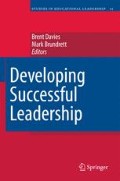Abstract
The purpose of this chapter is to describe and illustrate a new framework for leadership in education that moves to the foreground some key elements of the process which have hitherto been excluded or considered of minor importance. The framework is based on research in six countries (Australia, China, England, Finland, United States and Wales) in the International Project to Frame the Transformation of Schools. It is explained how successful schools were adept at creating and strengthening four kinds of capital – intellectual, social, spiritual and financial – and aligning and sustaining them to achieve their mission. It is argued that creating, strengthening, aligning and sustaining the four forms of capital do not occur by themselves: outstanding governance is required. Central to the purpose of this chapter, outstanding governance calls for outstanding leadership. Detailed illustrations are provided of leadership as capital formation at the school and system levels. The framework is compared to other frameworks and its relevance to current efforts to set standards for school leadership is explained.
Access this chapter
Tax calculation will be finalised at checkout
Purchases are for personal use only
References
Barber, M., & Mourshed, M. (2007). How the world’s best-performing school systems come out on top. London: McKinsey & Company.
Beare, H. (2001). Creating the future school. London: Routledge.
Bolman, L., & Deal, T. (2003). Reframing organizations: Artistry, choice and leadership (3rd ed.). San Francisco, CA: Jossey-Bass.
Caldwell, B. J., & Harris, J. (2008). Why not the best schools? Camberwell: ACER Press.
Caldwell, B. J., & Loader, D. (2009). What is a futures focused school? Special workshop materials prepared for the Futures Focused School Project of Teaching Australia (Australian Institute for Quality Teaching and School Leadership). Acton, ACT: Teaching Australia.
Caldwell, B. J., & Spinks, J. M. (2008). Raising the stakes. London: Routledge.
Cheng, Y. C. (2005). New paradigm of school leadership. In New paradigm for re-engineering education: Globalization, localization and individualization (chap. 9, pp. 213–242). Dordrecht: Springer.
Davies, B. (2006). Leading the strategically focused school. London: Paul Chapman Publishing.
Department of Children, Schools and Families (DCSF) & National College for School Leadership (NCSL). (2008a). The national standards for school leadership. Consultation paper. Accessed January 15, 2009. from http://www.ncsl.org.uk/publications-national-standards-consultation.
Department of Children, Schools and Families (DCSF) & National College for School Leadership (NCSL). (2008b). The national standards for school leadership. Accessed January 15, 2009, from http://www.ncsl.org.uk/publications-national-standards-consultation.
Department of Education and Early Childhood Development (DEECD) (Victoria). (2008). Blueprint for education and early childhood development. Melbourne, VIC: DEECD.
Douglas, E., & Harris, J. (2008). Why not the best schools? The Australia report. Camberwell: ACER Press.
Educational Transformations. (2008). A Study of the Regional Effectiveness Model in Hume. Unpublished report to the Regional Director of the Hume Region, Department of Education and Early Childhood Development, Victoria.
Egan, D. (2008). Why not the best schools? The Wales report. Camberwell: ACER Press.
Goodfellow, M., & Walton, M. (2008). Why not the best schools? The England report. Camberwell: ACER Press.
Hopkins, D. (2007). Every school a great school. Maidenhead: Open University Press.
Ingvarson, L., Anderson, M., Gronn, P., & Jackson, A. (2006). Standards for school leadership. Acton, ACT: Teaching Australia.
Loader, D. (2007). Jousting for the new generation. Camberwell: ACER Press.
Mintzberg, H. (1995). Strategic thinking as “seeing”. In B. Garratt (Ed.), Developing strategic thought: Rediscovering the art of direction-giving (chap. 5). London: McGraw-Hill.
Peters, T. J., & Waterman, R. H. (1982). In search of excellence. New York: Harper and Row.
Saarivirta, T. (2008). Why not the best schools? The Finland report. Camberwell: ACER Press.
Sergiovanni, T. J. (1984). Leadership and excellence in schooling (pp. 4–13). Educational Leadership, 41(3).
Zhao, Y., Ni, R., Qiu, W., Yang, W., & Zhang, G. (2008a). Why not the best schools? The China report. Camberwell: ACER Press.
Zhao, Y., Ni, R., Qiu, W., Yang, W., & Zhang, G. (2008b). Why not the best schools? The US report. Camberwell: ACER Press.
Acknowledgements
The contributions of Dr Jessica Harris to the research underpinning this chapter are acknowledged. She managed the International Project to Frame the Transformation of Schools and was co-author of Why not the best schools? (Caldwell & Harris, 2008) that reported the findings. Appreciation is extended to Stephen Brown, regional director of the Hume Region, Department of Education and Early Childhood Development (Victoria), who gave permission to draw on the Educational Transformations report (Educational Transformations, 2008).
Author information
Authors and Affiliations
Corresponding author
Editor information
Editors and Affiliations
Rights and permissions
Copyright information
© 2010 Springer Science+Business Media B.V.
About this chapter
Cite this chapter
Caldwell, B.J. (2010). Developing Leadership Capital. In: Davies, B., Brundrett, M. (eds) Developing Successful Leadership. Studies in Educational Leadership, vol 11. Springer, Dordrecht. https://doi.org/10.1007/978-90-481-9106-2_10
Download citation
DOI: https://doi.org/10.1007/978-90-481-9106-2_10
Published:
Publisher Name: Springer, Dordrecht
Print ISBN: 978-90-481-9105-5
Online ISBN: 978-90-481-9106-2
eBook Packages: Humanities, Social Sciences and LawEducation (R0)

